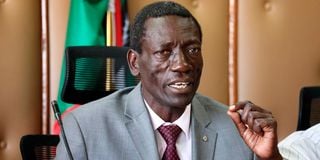Happening now: Liveblog: Kenyan youth stage #OccupyEverywhere protests
Teachers up in arms after missing Junior Secondary School jobs

Kenya National Union of Teachers Secretary-General Collins Oyuu addresses journalists in Nairobi on February 6, 2024.
What you need to know:
- Principals are worried about the lack of preparedness for the transitioning of Grade 9 learners.
Mr Oyuu said after getting P1 qualifications, the teachers took courses to upgrade their skills.
Primary school teachers have picked a fight with the Teachers Service Commission (TSC) for failing to upgrade them to teach Junior Secondary Schools and instead employed graduate teachers.
Through the Kenya National Union of Teachers (Knut) the teachers said that despite upgrading their skills they were overlooked.
Knut said that some of the graduate teachers who were given jobs lack the requisite skills to teach the Junior Secondary School (JSS) learners.
In an interview with the Nation, Knut Secretary-General Collins Oyuu said the graduate teachers do not fit the bill, and as a result, there is no proper learning in JSS.
“There is no way a teacher who trained in English and Literature is being pushed to handle Music, Art and Craft, Computer and the other subjects. Teachers in primary schools can take over and teach Grade 7 and Grade 8 learners,” said Mr Oyuu.
He said that Knut is rolling out a quick policy paper to determine exactly who should remain in JSS and also explain the losses that the teaching fraternity has encountered due to the staffing of the JSS teachers.
The Knut secretary-general said that 80 percent of what is happening in JSS (Grade 7 and 8) is being done by primary school teachers.
Mr Oyuu said Knut will carry out a situational analysis in all public schools in consultation with technocrats in the education sector. Mr Oyuu claimed that there is a silent rebellion and confusion in JSS.
The official urged the Ministry of Education and the TSC to deliberate on the JSS.
“Why were the P1 teachers taken back to college to augment their courses? Why was the upgrading done? For what reason? What was its use? Let every person concentrate on where they can work efficiently so as to avoid confusion,” he added.
Mr Oyuu said it was uneconomical for the commission to employ JSS teachers to do nothing yet they earn hefty salaries.
“What is so interesting in Grades 7 and 8? Nothing! There is nothing new. I want to remind the Teacher Service Commission that the Ministry of Education did not ask P1 teachers to upgrade their skills for nothing. The reason was to give them the ability to handle Grades 7, 8 and 9,” said the union boss.
Mr Oyuu said after getting P1 qualifications, the teachers took courses to upgrade their skills.
“Why must you employ a teacher who graduated in English and Literature to teach Grades 7, and 8. They are doing nothing in those schools,” insisted the union boss.
Since 2021, Knut and the Kenya Primary Schools Head Teachers Association (Kepsha), have been pushing the State to domicile Grades 7, 8 and 9 in primary schools instead of secondary schools.
“Our primary school teachers can handle these learners since 80 percent of them are graduates and some even have masters degrees,” said Mr Oyuu.
However, in 2022, President William Ruto domiciled JSS in primary schools following stakeholders’ engagement.
Dr Ruto formed the Presidential Working Party on Education Reforms to look into the Competency-Based Curriculum system. The taskforce engaged experts including union officials and teachers' associations.
The 42-member taskforce was chaired by Professor Raphael Munavu, and it engaged parents, teachers, religious leaders, school owners and other key education stakeholders.
The taskforce moved across the country to collect views, including from Kepsha, Kenya Union of Post Primary Education Teachers (Kuppet), and the Kenya Secondary Schools Heads Association. The stakeholders proposed that the JSS be in primary schools.
Secondary school head teachers and Kuppet have been urging the State to allow the Grade 9 learners to transit to learning institutions which have adequate infrastructure such as laboratories, classrooms and teachers, instead of the existing primary schools which are grappling with inadequate infrastructure.
However, Education Cabinet Secretary Ezekiel Machogu said that Grade 9 will remain in primary schools as the State races against time to put up more infrastructure for the first cohort of the Competency-Based Curriculum (CBC) learners.
There has been a lot of pull and push among stakeholders on where Grade 9 learners should be located due to congestion in public schools across the country.
Principals are worried about the lack of preparedness for the transitioning of Grade 9 learners.





